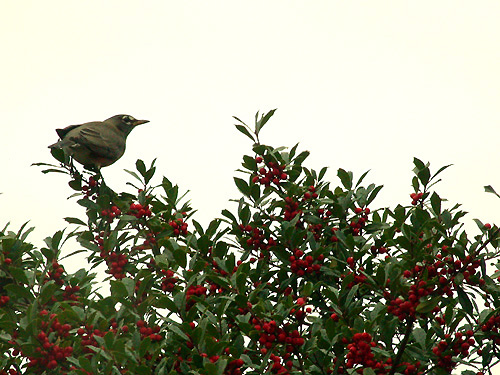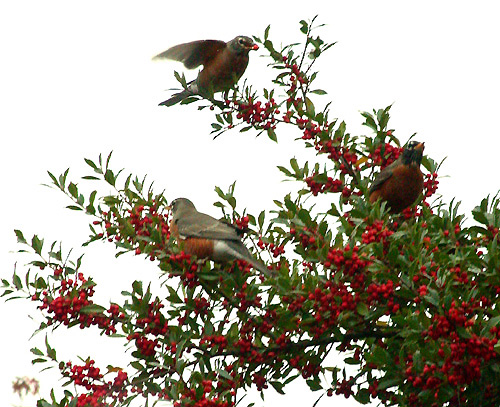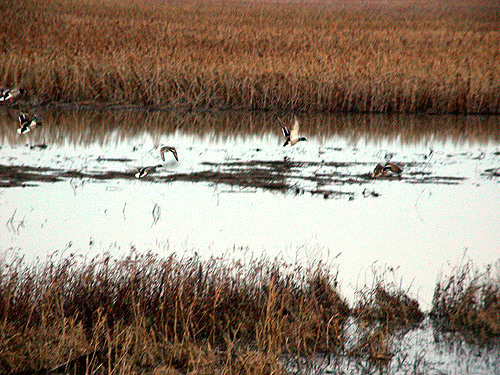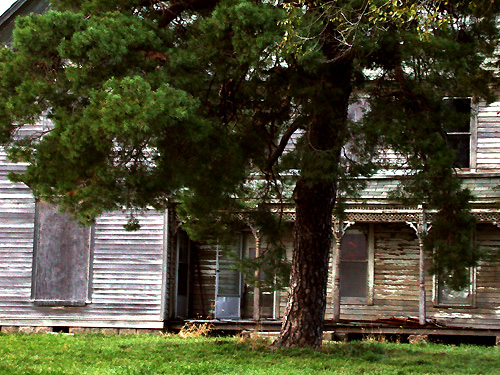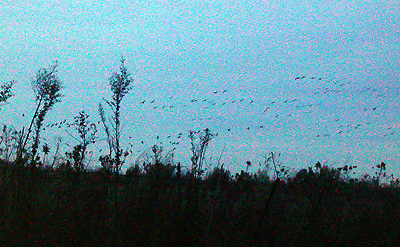Recovered from the Wayback Machine.
The sun is out and I’m heading out to get pictures of flocking birds while I can, weighed down by three cameras, six lenses (including one 300mm), and various stands and other accoutrement.
Speaking of flocking, the email conversation yesterday that led to the G Quotient posting, ended up generating an interesting conversation, at least among the women on the group. And a few men, but most of the men on the list were noticeably silent. Normally I don’t like to reference external communications in this weblog because it makes it seem like I’m going, “I was there and you weren’t! Neener, neener!” But in this case, yesterday’s conversation should have taken place on the weblog in the first place, and hence the move.
The power of weblogs is that anyone can have one and post their thoughts online. There is a true democracy at work. However, a democracy isn’t always the best form of group organization within a heterogeneous body. What happens is that the majority tends to hold all the influence.
Supposedly within weblogging, women form over 50% of the webloggers, and yu would think that they then receive 50% of the links. However, what I’m finding, at least in the weblog circle that I tend to traverse on my daily prowls, is that links to women occur much less frequently than links to men. I’m not talking blogroll links; I’m talking about links to posts, with associated commentary.
No big deal, you say. After all, anyone can have a blog and yadda yadda ya.
The big deal is that if within the new semantic web we talk about, we’re saying that the link is where meaning arises and discovery occurs — so what happens when 50% of the population receives 25% of the attention? Or more specifically, what happens when women, to get more of this attention, form groups of webloggers linking to each other, but get scant attention from the males hereabouts? My friend Sheila had the perfect word for it — the women are effectively becoming ghettoed.
I wrote in an email yesterday (edited to fit this format):
If it’s through links that we discover each other, and within the new web, the semantic web we’ve discussed recently it’s through the link where meaning is discovered, then what happens when women are not linked? Or are only linked within certain contexts? This isn’t necessarily about individuals; this is about how women are ultimately being ghettoed online, by link and by association. Or lack thereof.
It shouldn’t matter who we link to, and how we frame that link, but it does. Can’t we be honest enough with ourselves about this?
Baldly stated, women are second class citizens in weblogging, and this classification is enforced through links. We can say good writing is all that matters, but thats the same as saying there’s less women in the technorati 100 because women can’t write. Or if politics is the issue, then women never talk about politics. I don’t see this within my own reading.
But do we talk about these things differently, in such a way that male writing has more appeal? And since men have most of the link power, like goes to like? I don’t know. Would be a fascinating study, wouldn’t it?
The buzz sheets, who cares, but influence, yeah I care about that. And not only are women not as represented, but the women who were in the sheets have been dropping. About the only ones rising are the warbloggers — so maybe this is really about politics.
As Kevin pointed out in my comments, at first glance women may not seem as represented in the buzz sheets, but if you start looking at all of the group weblogs, there are more women then first appears. So I went snooping among the Technorati Top 100.
First, I found that only about 55 of the Top 100 are weblogs in the true sense of the term. I also found that people don’t update their blogrolls because more than one site had moved and the link was dead (what does that say about the Top whatever sheets that we see? That blogrolls are more a matter of habit than use?)
Secondly, my reaction was: who are these people? I have never heard of several of them, but then a quick look at the writing showed me that they’re primarily within the ‘warblogging’ domains, and I only visit these circles when I’m feeling particularly pugnatious. There was also more than foreign language weblog (which I put into other if I couldn’t determine the gender) and several LiveJournal weblogs.
However, doing a count and placing weblogs into male, female, both, and other, I came up with the following counts:
Male – 38
Female – 7
Both – 3
Other – 7
Feel free to check my facts. Even if all the others resolve to female, which I don’t think they will, women are represented in only 31% of the top weblogs — and that’s throwing in the influence of the women in the group blogs.
The Blogging Ecosystem seems to have a better distribution of women to men, but closer inspection shows that women are still badly underrepresented in the upper ranks.
Why? If we do link to women less than men, why?
I know for myself that coming from a technology background, I tend to link to other technologists and most of them are men. Or at least, that’s what I thought. What I’m finding is that there are a lot more women technologists online, but they don’t necessarily get the focus or the attention.
Hmmm. Now, why is that?
I wondered if it was because men tend to write about specific uses of technology, which women tend to talk about the human influence of the technology. After all in the semenatic web discussion recently, that was my contribution.
(Which so traumatized the Guys of Geek that they’ve since spent their time since comparing each other’s….early geek experiences.)
But then there’s Julie Lerman’s .NET blog (good lord, do you see how few women there are that are .NET bloggers?), or Scripty Goddess. Betsy Devine did the code thing today, with an interesting segue into The Graduate.
However, one big difference is that the women technologists rarely venture into technologies that are, bluntly, focused around one of weblogging’s Big Dogs — Dave Winer. In fact, aside from myself, the only women I know of who have waded into RSS or Weblogging APIs or Atom or any of these discussions has been Dorothea Salo and Liz Lawley and I believe Betsy and Meg Hourian have also in the past. If there are other women involved in these discussions I don’t know of them because they’re not being linked!. I only know about Dorothea and Liz because they’re part of my neighborhood, not because they’ve been linked by the tech community overmuch.
Hmmm. Now why is that?
Here’s a thought: Perhaps its because neither of them calls Dave Winer an asshole enough to generate attention. In other words, its not that women aren’t talking tech, it’s that few women are joining the religous battles about technology, and it is these that generate the buzz.
In fact, if you look at many of the top linked women webloggers on all the the lists you see three significant factors that could explain their prominance:
1. The weblogger is an early adoptee, for instance Meg Hourihan, Rebecca Blood, and xeni at Boing Boing.
2. The weblogger is emotionally charged, many times pugnacious.
3. For all, the weblogger has been linked more than once by one or more of weblogging lodestones, people with significant influence.
The early adoptee women tend not to be pugnacious, but the women entering the weblogging circles after the initial founders to tend to be. I don’t mean this in a negative sense — just that they have strong likes and dislikes and few inhibitions about expressing them.
Most importantly, though, and a characteristic shared by all the women is that they are linked, sometimes frequently, by one or more lodestone weblogs — Scripting News, Boing Boing, Instapundit, Doc Searls, and Jason Kottke, give or take another lodestone weblog or two.
(The only weblogs that defy this characteristic is the LiveJournal weblogs. If anything, true weblogging democracy is demonstrated within the LiveJournal weblogs more than within any other inner circle within weblogging. )
Do women then have to take on the guise of handmaiden to the gods of virtuality to be an influence?
This then returns me to my original thought about links and influence, and the gender ghetto. Yes weblogging is open to all and anyone can publish online, but one’s reach, one’s influence is directly related to how much one is linked. You may be an inspiration to your circle, but if you circle has three readers, your influence is not as great as someone linked by a thousand readers.
Most times this isn’t an issue — who cares if you’re linked or not as long as you’re satisfied by your readers and what you write, and I agree with this. But what happens as weblogging becomes more influential in politics and social reform? Women’s voices have not not been heard as loudly as they should in these areas in the past — is this same lack of influence now going to be taken into the communication media of the future?
Think about that picture of President Bush signing the new abortion law and you all wrote, “Look there are no women present.”
Are women linked less because our voices are different? Are we not as confident when making our assertions and are therefore less quotable? Are we not as aggressive in our opinions, and therefore less interesting?
It could be that women in weblogging share much with our sisters in ancient Japan, where women wrote in one language while men wrote in another and Women’s Writing was tantamont to being a derogatory statement. But it was the Women’s Writing that survives to today; perhaps this new form of Women’s Writing will the only writing that survives into the future. We know that quality of writing or subject matter is not a factor in any of this — quality exists across gender, and subject matter ranges far and wide with both sexes. Perhaps our influence will stand the test of time.
But then I look at that photo of all those men standing around the President signing into law a bill that could effectively condemn some women to death; I think about women’s lack of representation as tech workers and CEOs in this country; women being denied equality in education, employment, health care, and even justice in other countries; women being stoned to death for adultery while men screw with impunity; and I am not content to be an influence in a thousand years.
I want to be an influence now.


